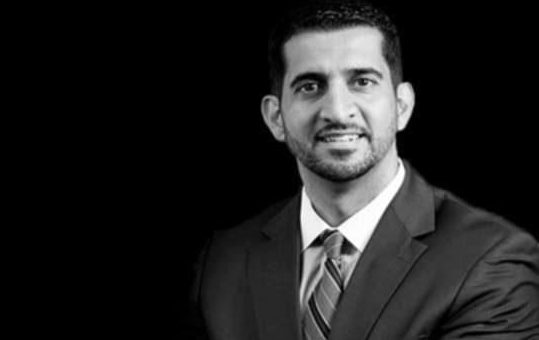
From Refugee to Entrepreneur: Patrick Bet-David dishes on how he pulled himself up
We love a good rags to riches story. But what does that look like when someone is making the climb?
Going from a refugee camp to an entrepreneur, Patrick Bet-David is one person who knows what it looks like to climb to the top, despite some pretty rough odds.
Immigrating from Iran to Germany as a child and living in a refugee camp with his family, Bet-David used the resources around him to build his skills as a businessman.
Now, he uses his position to spread the word to other aspiring leaders in the industry with his YouTube channel, Valuetainment.
Grit Daily sat down with him to talk about his experience under a communist dictatorship, fatherless upbringings, and why not everyone likes his content.
Grit Daily: For the uninitiated, share on your early years as a refugee.
Patrick Bet-David: Well I was ten years old when I first got to Germany and lived at this refugee camp. I was there with folks from Yugoslavia, Albania, Poland, Czech. Everybody that was pretty much escaping some kind of a regime that was a dictatorship or communistic or whatever that was going on. And we were there.
It was my first experience without my father being around. I lived there for two years without a father figure. It was myself, my sister, and my mom. I got a chance to go outside and play and build relationships and that was the first time I ever did business. Super Nintendo was coming out and I went to a local swimming pool where people were drinking a lot of beer and I went to the owner and I asked him, “listen if I clean this place up would you be willing to pay me something for each bottle I bring in?” He said yes, he paid me 5 pfennig per beer bottle.
There was a girl at the refugee camp named Katarina who was beautiful, and her brother’s name was Jan Staff who ended up becoming my best friend. He wanted a Super Mario Brother’s video game, I wanted his sister. Well a month later I collected 5,000 beer bottles, the pool owner paid me 250 marks. I went to Kaufhof and bought myself a Super Nintendo and brought it back for Jan, He played with the Super Nintendo and I played with his sister. So that was my first experience as an entrepreneur.
Alright so that was the first one, but good experience, obviously we didn’t live in a luxury place. They would put food at the corner of the street. You’d go pick up the juice, the milk and whatever we got. It was a pretty nasty place, but there were friendships and relationships. Many of the people that I was at the refugee camp with, in 1989, I still speak to and that was 30 years ago.
GD: Your content has changed since you started out. What drives that?
PBD: Two things. One, I’ve changed. I’m continuously changing and so every time I’m getting to a different phase. Like when we first started posting the first content, I had probably 4-5 employees, and at the financial firm and the insurance company I ran, we probably had 400-500 agents. Today I have nearly 100 employees and nearly 9,900 insurance agents in 49 states. We used to do a million to two million a year.
We’ll do a close to a $100 million in 2019 and obviously, the business is a different side. My skill sets have changed, and I’m changing as a CEO. I went through an evolution of being an executive to a sales leader to learning what it is to be a CEO, what it is to really be a CEO with investors such as Oscar De La Hoya, Gabriel Brener, and the Atalaya Capital Management fund.
Since my role has changed and evolved, my growth had to change as well along with making new mistakes and so many other things that add to a change in content I create.
As you’re building your business, you’re slaying a lot of dragons as well. Sometimes you’re getting crushed throughout the process and getting knocked down but once in a while, you have to get up. Then, your perspective or “lens of life” as I like to call it changes; you start to view the business world in a completely different way which leads to a change in content from who were previously.
GD: Do you still think about your time in Iran? What are those memories?
PBD: All the time! As a matter of act, I’m sitting in my office right now with a 15 by 6-foot painting that I had a local painter create for me. He did some similar work with Mark Cuban that’s in the American Airlines Center.
This painting has nine figures in it, meaning nine individuals. In the painting, one of them is Einstein, Kennedy, Lincoln, Tupac, myself, Ayrton Senna (the Formula 1 driver), Martin Luther King Jr., Milton Friedman, the Shah of Iran, and there’s an empty seat which is meant for someone else. The setting is a vault and the discussion is based between these figures and two books.
I think about Iran every day. I think about going back to Iran every day. I listen to a song called “Delam Mikhad be Isfahan Bargardam.” The song says “my heart wants me to return to Isfahan.” It’s a song sang by a famous Persian singer called Moein. Isfahan is a city in Iran.
It is the only vacation that I went to with my parents when they were together, so I think about Iran all the time. Iran brings back memories of good and bad because my family was together, I would see my dad every night, I would see my mother, her friends. The bad was war, bombing all the time. I think one time we got bombed 167 times in a day. It was a pretty ugly situation but great memories still at the same time.
GD: How has your view of family changed over time?
PBD: Yes, and a lot because you know when you’re growing up everybody is a family.
Beverly Hills MD
Plastic Surgeon Tells: “Doing This Every Morning Can Snap Back Sagging Skin (No Creams Needed)”
Plastic Surgeon Tells: “Doing This Every Morning Can Snap Back Sagging Skin (No Creams Needed)”
Learn More
And as you’re aging and you actually realize which ones matter the most and I actually put more of my concentration to fewer people rather than trying to do to everybody because I think if you try to please everybody and your family you’re going to be miserable. There’s nothing more miserable than trying to conform to everybody’s happiness and you lose your happiness and you lose your fulfillment then nobody wants to be around you.
But then the other side is when you have kids you learn the differences between the way you love your mom, between the love for a dad, between a love for a sibling, between a love for a friend, between a love for a puppy love, between a love for a wife, and then between a love for a kid.
And I am going to be taking my time before I have the experience of a love for a grand kid because my oldest is seven, he’s got to take his time. But it evolves, life is very strange it changes a lot and you appreciate all the mistakes, you start realizing that sometimes even in life, your friends become more family to you than your existing family so a lot to learn there constantly.
GD: With your viewership numbers, what does your audience say is resonating with them?
PBD: So it’s interesting with my audience because my audience, I have an audience that especially comes to me for content about entrepreneurship and business. That audience isn’t necessarily interested in all my interviews because my interviews range from athletes, from Magic Johnson to Phil Heath seven-time winner Mr. Olympia to Wayne Gretzky to James Worthy to coach Calipari and all these other guys. It ranges from those personality types all the way to business with Mark Cuban, with Chip Wilson who founded Lulu lemon to investors to a bunch of different people.
Then it goes to politics and it ranges with both sides from politicians to free thinkers to a bunch of different personalities and we’ll go into mob interviews and Pablo Escobar type of interviews such as the DEA agents, FBI agents, and financial experts and so because it’s so ranged I have people who love it and I have people who hate it but it has grown so we’re learning the fact that even though you have a channel with 1.2 million subscribers and billion minutes watched.
Not everybody likes all the shows and you have to realize you can’t make everybody happy if you have different segments, so we had to learn that over time.
GD: What gets your interviewees to open up?
PBD: That’s a good question. I would say the fact for me I get interviewed often on other podcasts and YouTube channels and recently there was one with London Real that I did in London with a guy named Brian Rose who just did a phenomenal job with his interviews, he got a lot of information out of me and I also did one with Tom Bilyeu he has a show called Impact Theory.
One of the things I respect about somebody who interviews me is research. If you do research that means you are interested in the product which is me.
So for me if I interview a guest I do so much research on that individual that when I sit down with you and when I’m doing the interview you are surprised by the information that I have and that gets you to step away saying this guy really takes my time seriously and you end up respecting the fact that I did my research so you end up being open about it because I am being fair with you as well and giving you the respect at covering all the other basis and I don’t just go one side.
I’m willing to listen to all the different sides to see why you are wired the way you are rather than trying to push my stuff down your throat. I try to find out why you are wired the way you are and that’s worked well with our audience.
In a new generation of entrepreneurs, many are like Bet-David: using their gritty past, background, and beliefs to keep a business going.
- Posted by press@bcenterpriseusa.com
- On May 10, 2022
- 0 Comment



